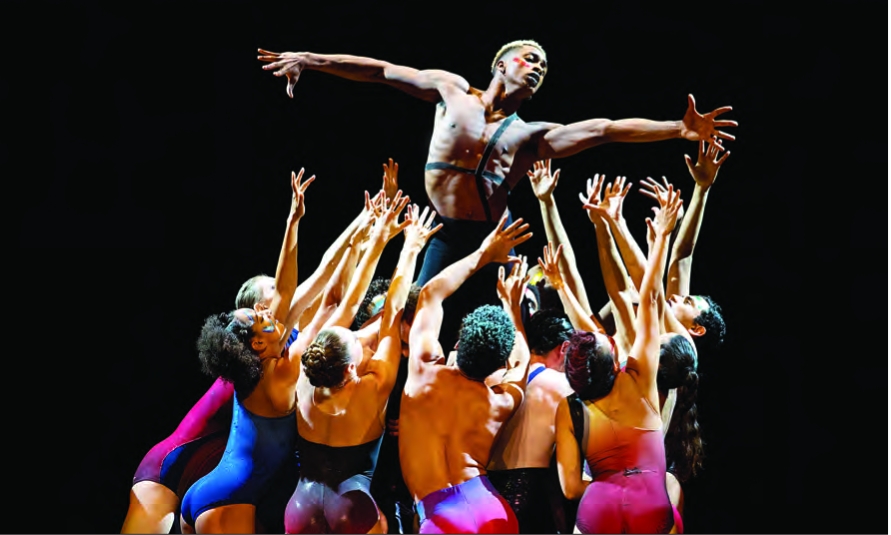
Complexions Contemporary Ballet performs “STAR DUST.” Spanning four centuries of music and multiple genres of dance, Complexions Contemporary Ballet performed two shows last weekend at the Emerson Cutler Majestic Theatre in Boston, presented by Global Arts Live.
Entitled “From Bach to Bowie,” the company’s 90-minute program provided an exciting introduction to the dancers and their repertoire. Choreographed by company co-founder Dwight Rhoden, the program began with a suite of five short works and, following an intermission, continued with a performance of “STAR DUST: A Ballet Tribute to David Bowie” (2016). Debuted a year after Bowie died from cancer, the dance opera is the first installment of what will become a full-length ballet that explores the rhythms, personas and dramas in Bowie’s music.
Rhoden, a former Alvin Ailey American Dance Theater principal dancer, and Desmond Richardson, the first African American principal dancer of the
American Ballet Theatre, co-founded the New York-based company in 1994
and remain its artistic directors.
Through
its performances and academy, Complexions fosters a full-body technique
that combines elements of classical ballet and contemporary dance to
heighten a performer’s individuality, expressiveness, freedom and
precision.
Theirs is a physical language conducive to the unexpected.
These
qualities were on display as the dancers performed to music by
18th-century Baroque masters Johann Sebastian Bach and George Frederic
Handel; a 2023 classical composition from the Pocket Symphonies of Sven
Helbig; an anguished anti-lynching ballad, “Another Man Done Gone,” sung
by Odetta; and “Blood Calls Blood (excerpt)” (2023) by New Orleans jazz
musician Chief Xian aTunde Adjuah (formerly Christian Scott).
“Bach 25 (excerpt)” introduced the 20-member ensemble. Stark black-and-white staging with overhead
lighting by Michael Korsch and minimalist, skin-toned costumes by
Christine Darch — body suits for the women and briefs on the men —
emphasized the contours of dancers’ muscles and the variety of their
bodies. Some were long and slender like reeds, while others were robust
and small in stature. They demonstrated their power, verve and precision
in pairings, trios and clusters that were often linear and angular in
form.
In “Gone,”
Michael Cherry, Aeron Buchanan and Angelo De Serra used visceral
repetitive movements to embody the pulsing rhythm of Odetta’s chanting
vocals. Alberto Andrade accompanied Jillian Davis, a quicksilver
presence who moves with astonishing elasticity, for an edgy pas de deux
in “Handel Remixed.” Accenting its surreal style was Darch’s costume for
Davis, whose skirt, traditionally a shimmering fan of gauze, was
instead a stiff orange disc. Matching the surging improvisations in
“Blood Calls Blood (excerpt)” was a thrilling ensemble performance by
Alberto Andrade, Christian Burse, Lucy Stewart and Joe Gonzàlez.
Gonzàlez,
a Boston native, was a riveting figure here and throughout the program,
injecting passion and authority into his various roles. Speaking by
phone recently, González, a graduate of Boston Arts Academy and Boston
Conservatory and a member of Complexions since 2022, cited the Roxbury
Center for the Performing Arts as “the place where I discovered the
emotion and soulfulness of dance.”
González
is also co-executive artistic director and choreographer of Jamaica
Plain-based Jo-Mé Dance, which on Oct. 19 performed the Boston debut of
“Unbroken” at the Strand Theatre. The work tells the story of Sean
Ellis, imprisoned for 22 years for a crime he did not commit. Ellis was
in attendance.
“STAR
DUST” unfolds to nine songs drawn from the four-decade career of David
Bowie, a master conjurer who in 25 albums and in films and stage
spectaculars created a truth-telling language out of fantastical
characters and stories rich in artifice. The piece’s simple staging
evoked Bowie’s alchemy. Korch’s lighting highlighted the dancers’
glitter-dusted faces and the sparkling costumes by Darch, which
resembled the whimsical attire often worn by Bowie.
Songs
that reincarnate Bowie personas turned the dancers into actors as they
lip-synched the lyrics while dancing. González was convincingly
passionate in the poignant “Lazarus,” from Bowie’s final album,
“Blackstar” (2016). Another selection, Peter Gabriel’s melancholy
rendering of “Heroes” (1977), recalled Bowie’s artifice-free performance
at the post-9/11 concert in Madison Square Garden for police and
firefighters, where he sang the song and dedicated it to his local
ladder company.
Complexions concluded the program with an infectious performance of Bowie’s “Let’s Dance.”
ON THE WEB
Learn more at
complexionscontemporaryballet.org
jo-medance.org
globalartslive.org